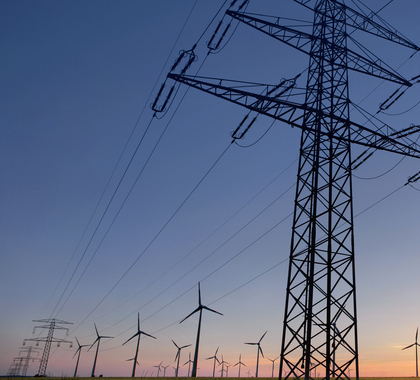In a setback for the renewable-energy industry, Iowa now has a law barring the use of eminent domain for high-voltage transmission lines carrying wind energy across the state into Illinois.
The battle over right of way for transmission lines transporting wind energy has been raging in Iowa and neighboring Illinois for more than six years. Gov. Terry Branstad’s (R) May signing of Senate File 516, a large energy bill including the eminent domain provision, caps the latest skirmish pitting rural landowners against what they see as government-sanctioned infringements of their property rights by developers of wind power.
Houston-based Clean Line Energy Partners has been seeking to install overhead transmission lines stretching 500 miles from western Iowa to the PJM Interconnection in Grundy County, Illinois. PJM is a regional transmission organization coordinating the movement of wholesale electricity in all or parts of 13 states and the District of Columbia. Upon completion, Clean Line’s Rock Island project would transmit 3,500 megawatts of wind-derived electricity to a PJM converter station in Illinois.
Landowners Resist
From the outset, farmers, ranchers, and other landowners along the path of the proposed transmission line have objected to Clean Line’s efforts to be treated as a public utility, which would allow it to use eminent domain to obtain the right of way for the Rock Island project from reluctant property owners.
Organized resistance resulted in the formation of the Preservation of Rural Iowa Alliance (PRIA), a grassroots group that has tied up Clean Line in Iowa’s complicated regulatory process.
Iowa law requires Clean Line to obtain franchise approval from each county through which the transmission line will run. The company filed for franchises in the fall of 2014 but withdrew all 16 applications in December 2016 as the legislature considered a bill supported by PRIA to require a two-year time limit for processing franchise applications for transmission lines.
Don Racheter, president of the Public Interest Institute, said although Iowans want cheap energy, they also love their property rights.
“Iowans understand cheap energy is important to growing our economy, and that wind energy has been an important income supplement to many farmers in windy states like Iowa,” Racheter said. “However, in deciding how to transport this electricity from where it is produced to urban areas that want to consume it, the businesses involved made a poor decision.
“Instead of trying to use eminent domain or the threat of its use to acquire land for a new line, they should have worked out deals with firms to erect taller transmission towers above existing utility corridors,” said Racheter.
Developments in Illinois
Trouble is also brewing for Clean Line in Illinois. The Illinois Commerce Commission (ICC) granted Clean Line utility status and approval to build the Illinois portion of the transmission line, complete with eminent domain power. An appellate court overturned that decision in 2016. ICC challenged this decision, and the issue now lies with the Illinois Supreme Court, with a ruling expected later in 2017.
Environmental groups such as the Natural Resources Defense Council and labor organizations such as the International Brotherhood of Electrical Workers support the Rock Island line in Illinois. Commonwealth Edison, the Illinois Farm Bureau, and the Illinois Landowners’ Alliance oppose it, with the latter saying on its website the organization’s opposition stems from Clean Line’s “unprecedented use of Eminent Domain.”
Hoisted by Their Own Petard
James Taylor, president of the Spark of Freedom Foundation, says environmentalists’ arguments against the use of eminent domain for oil and gas pipelines are being turned against them in their efforts to promote power-line construction necessary to transport electric power generated by wind and solar farms.
“In their efforts to shut down oil and gas, environmental activists often attempt to appeal to conservatives along eminent domain lines, arguing the government should not use the power of eminent domain to authorize oil and natural gas pipelines when landowners choose not to sell their land or grant right of way for a pipeline,” Taylor said. “It is rather ironic these same environmentalists now argue government should not be restricted from using eminent domain to establish wind-power transmission lines.
“Environmental activists’ hypocrisy is nothing new,” said Taylor.
Bonner R. Cohen, Ph.D. ([email protected]) is a senior fellow at the National Center for Public Policy Research.




